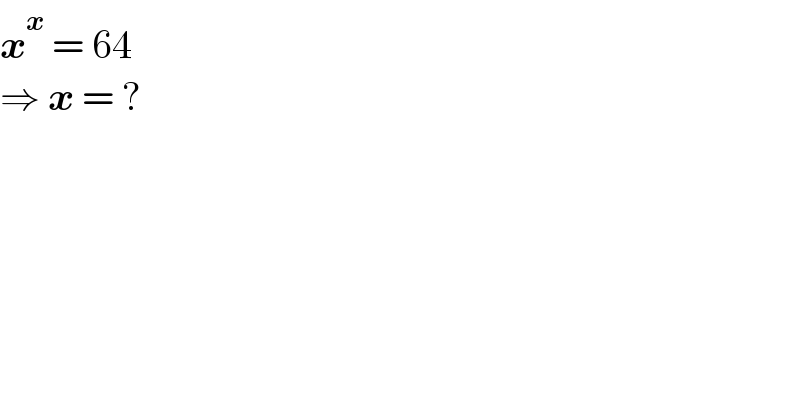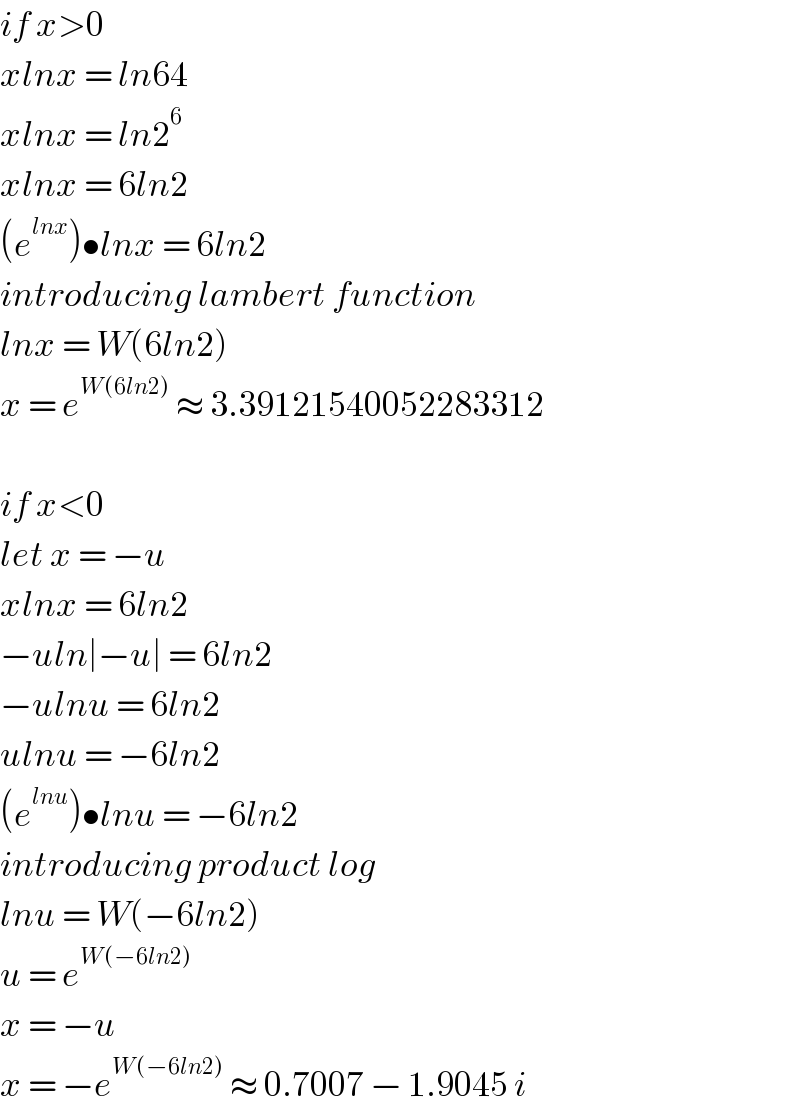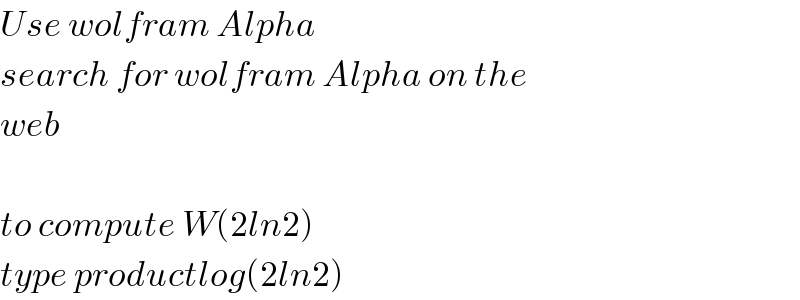Question Number 148395 by mathdanisur last updated on 27/Jul/21

$$\boldsymbol{{x}}^{\boldsymbol{{x}}} \:=\:\mathrm{64} \\ $$$$\Rightarrow\:\boldsymbol{{x}}\:=\:? \\ $$
Answered by Math_Freak last updated on 27/Jul/21

$${if}\:{x}>\mathrm{0} \\ $$$${xlnx}\:=\:{ln}\mathrm{64} \\ $$$${xlnx}\:=\:{ln}\mathrm{2}^{\mathrm{6}} \\ $$$${xlnx}\:=\:\mathrm{6}{ln}\mathrm{2} \\ $$$$\left({e}^{{lnx}} \right)\bullet{lnx}\:=\:\mathrm{6}{ln}\mathrm{2} \\ $$$${introducing}\:{lambert}\:{function} \\ $$$${lnx}\:=\:{W}\left(\mathrm{6}{ln}\mathrm{2}\right) \\ $$$${x}\:=\:{e}^{{W}\left(\mathrm{6}{ln}\mathrm{2}\right)} \:\approx\:\mathrm{3}.\mathrm{39121540052283312} \\ $$$$ \\ $$$${if}\:{x}<\mathrm{0} \\ $$$${let}\:{x}\:=\:−{u} \\ $$$${xlnx}\:=\:\mathrm{6}{ln}\mathrm{2} \\ $$$$−{uln}\mid−{u}\mid\:=\:\mathrm{6}{ln}\mathrm{2} \\ $$$$−{ulnu}\:=\:\mathrm{6}{ln}\mathrm{2} \\ $$$${ulnu}\:=\:−\mathrm{6}{ln}\mathrm{2} \\ $$$$\left({e}^{{lnu}} \right)\bullet{lnu}\:=\:−\mathrm{6}{ln}\mathrm{2} \\ $$$${introducing}\:{product}\:{log} \\ $$$${lnu}\:=\:{W}\left(−\mathrm{6}{ln}\mathrm{2}\right) \\ $$$${u}\:=\:{e}^{{W}\left(−\mathrm{6}{ln}\mathrm{2}\right)} \\ $$$${x}\:=\:−{u} \\ $$$${x}\:=\:−{e}^{{W}\left(−\mathrm{6}{ln}\mathrm{2}\right)} \:\approx\:\mathrm{0}.\mathrm{7007}\:−\:\mathrm{1}.\mathrm{9045}\:{i} \\ $$
Commented by Tawa11 last updated on 27/Jul/21

$$\mathrm{Sir},\:\mathrm{please}\:\mathrm{how}\:\mathrm{can}\:\mathrm{we}\:\mathrm{get}\:\mathrm{the}\:\mathrm{complex}\:\mathrm{number}\:\mathrm{from}\:\:\:\:\:\:−\:\mathrm{e}^{\mathrm{W}\left(−\:\mathrm{6}\:\mathrm{ln2}\right)} . \\ $$$$\mathrm{How}\:\mathrm{can}\:\mathrm{I}\:\mathrm{compute}\:\mathrm{it}.\:\mathrm{Thanks}\:\mathrm{sir}. \\ $$
Commented by Math_Freak last updated on 27/Jul/21

$${Use}\:{wolfram}\:{Alpha} \\ $$$${search}\:{for}\:{wolfram}\:{Alpha}\:{on}\:{the} \\ $$$${web} \\ $$$$ \\ $$$${to}\:{compute}\:{W}\left(\mathrm{2}{ln}\mathrm{2}\right) \\ $$$${type}\:{productlog}\left(\mathrm{2}{ln}\mathrm{2}\right) \\ $$
Commented by mathdanisur last updated on 27/Jul/21

$${Thankyou}\:{Sir}\:{cool} \\ $$
Commented by mathdanisur last updated on 27/Jul/21

$${Answer}\:{Sir}.? \\ $$
Commented by mr W last updated on 27/Jul/21

$$\left(\mathrm{0}.\mathrm{7007}\:−\:\mathrm{1}.\mathrm{9045}\:{i}\right)^{\left(\mathrm{0}.\mathrm{7007}\:−\:\mathrm{1}.\mathrm{9045}\:{i}\right)} \neq\mathrm{64} \\ $$
